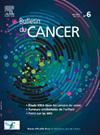Réhabilitation pré, per et post-allogreffe de cellules souches hématopoïétiques (SFGM-TC)
IF 1.1
4区 医学
Q4 ONCOLOGY
引用次数: 0
Abstract
L’allogreffe de cellules souches hématopoïétiques reste aujourd’hui le seul traitement curatif de certaines hémopathies malignes. Ce traitement peut être responsable de plusieurs effets secondaires entraînant des déficiences physiques et psychiques multiples et interdépendantes qui altèrent la qualité de vie, la participation sociale des patients, et peuvent être vécues comme un handicap parfois plusieurs années après la greffe. Depuis plusieurs années, l’intégration de parcours de réhabilitation postgreffe se démocratise et des initiatives de prise en charge pluridisciplinaires de plus en plus précoces sont étudiées. L’objectif de ces prises en charge précoces est d’améliorer l’état fonctionnel global du patient avant, pendant et après la greffe, afin de limiter l’impact du traitement, et un retour le plus rapide à une vie la plus satisfaisante possible. La littérature internationale, et les expériences mises en place sur l’ensemble du territoire francophone décrivent des pratiques hétérogènes. L’objectif de ce travail est, d’après cette littérature et ces expériences, d’émettre des recommandations homogènes de bonnes pratiques cliniques et des axes de recherches ultérieurs concernant la réhabilitation prégreffe, pergreffe, et postgreffe de cellules souches hématopoïétiques.
Allogeneic transplantation of haematopoietic stem cells is still the only curative treatment for certain haematological malignancies. This treatment can be responsible for a number of side-effects, leading to multiple and interdependent physical and psychological deficiencies that affect patients’ quality of life and social participation, and can be experienced as a handicap, sometimes for several years after the transplant. For several years now, the integration of post-transplant rehabilitation pathways has been becoming more widespread, and initiatives to provide multidisciplinary care at an increasingly early stage are being studied. The aim of this early management is to improve the patient's overall functional state before, during and after the transplant, in order to limit the impact of the treatment and ensure the quickest possible return to a life that is as satisfying as possible. The international literature and the experiments carried out throughout the French-speaking world describe heterogeneous practices. Based on this literature and experience, the aim of this study is to issue homogenous recommendations for good clinical practice and to identify areas for further research into pre-transplant, per-transplant and post-transplant rehabilitation of haematopoietic stem cells.
[异体造血干细胞移植前、移植前和移植后的康复(Atelier SFGM-TC)]。
异体造血干细胞移植仍然是治疗某些血液恶性肿瘤的唯一方法。这种治疗方法可能会产生一些副作用,导致多种相互依存的生理和心理缺陷,影响患者的生活质量和社会参与,并可能成为一种障碍,有时会在移植后持续数年。几年来,移植后康复路径的整合已变得越来越普遍,在越来越早的阶段提供多学科护理的举措也在研究之中。这种早期管理的目的是改善患者在移植前、移植期间和移植后的整体功能状态,以限制治疗的影响,确保患者尽快恢复尽可能令人满意的生活。国际文献和在法语国家进行的实验描述了各种不同的做法。根据这些文献和经验,本研究旨在为良好的临床实践提出统一的建议,并确定造血干细胞移植前、移植期间和移植后康复的进一步研究领域。
本文章由计算机程序翻译,如有差异,请以英文原文为准。
求助全文
约1分钟内获得全文
求助全文
来源期刊

Bulletin Du Cancer
医学-肿瘤学
CiteScore
1.90
自引率
16.70%
发文量
224
审稿时长
37 days
期刊介绍:
Without doubt, the ''Bulletin du Cancer'' is the French language publication of reference in the field of cancerology. Official organ of the French Society of Cancer, this journal covers all the information available, whether in the form of original articles or review articles, but also clinical cases and letters to the editor, including various disciplines as onco-hematology, solids tumors, medical oncology, pharmacology, epidemiology, biology as well as fundamental research in cancerology. The journal proposes a clinical and therapeutic approach of high scientific standard and regular updates in knowledge are thus made possible. Articles can be submitted in French or English.
 求助内容:
求助内容: 应助结果提醒方式:
应助结果提醒方式:


